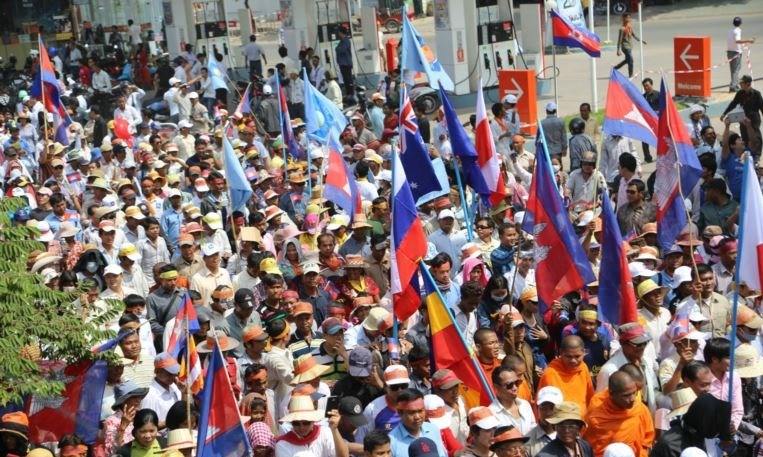Until November 2017, Cambodia’s democracy was enfeebled but still alive. There was, of course, a police state, a compliant judiciary and a biased electoral system, but there was a strong opposition with local and national organization, which, for the first time, was united under a single banner: the Cambodia National Rescue Party (CNRP). This united, democratic party was the only opposition represented in the national assembly with 55 seats out of 123, or 44%
Faced with the remarkable and unexpected success of the CNRP in the legislative and communal elections in July 2013 and June 2017, Prime Minister Hun Sen, in power since 1985, was scared. The democratic opposition had never achieved such scores: 44% in both the national and local elections. This was achieved despite the sustained use of threats and intimidation, as well as vote-buying and massive electoral fraud.
Hun Sen knew that the opposition represented a historic tide of change which he was powerless to resist. So he decided to simply dissolve the CNRP. At that point, democracy in Cambodia can be considered as dead. There can be no democracy without opposition, without a system of checks and balances. In the absence of any opposition worthy of the name, it was no surprise that the ruling party led by Hun Sen, the Cambodian People’s Party (CPP), won 100% of the seats in the last legislative elections of July 2018. It was a hollow victory.
The real and only reason for which Hun Sen had the CNRP dissolved in November 2017 is his fear of the popular will, which wants an end to his authoritarian, corrupt and archaic regime, and which demands democratic change. This popular will, led by the CNRP, is unprecedented in Cambodia’s modern history in terms of its scale and force. That fact is proved by photos of hundreds of thousands of protestors in the streets of Phnom Penh in 2013 and 2014.
Hun Sen first sought to dissolve the CNRP by legislative means at the start of 2017. In February, made-to-measure laws which specifically targeted the CNRP and Sam Rainsy were rushed through by the rump assembly and forced Sam Rainsy to resign as leader of the CNRP in an attempt to avoid the dissolution of the party. Hun Sen therefore decided to use the judicial route.
The new CNRP leader, Kem Sokha, was suddenly accused of "treason" by a court under the orders of Hun Sen. Kem Sokha was brutally arrested on the night of 3 September. On the basis of this personal charge made against Kem Sokha, the "Supreme Court" on 16 November ordered the dissolution of the CNRP.
The dissolution of the CNRP gave the signal to Hun Sen to confiscate the elected posts won by the opposition in the legislative election of 2013 (55 deputies) and the communal elections of 2017 (5,007 municipal councillors, including 489 mayors). These were then distributed to other parties. The deputy positions were given to small parties which were allied with the CPP but which, themselves, had not succeeded in winning any seats. The CPP simply awarded itself all of the municipal councillor posts won by the CNRP. The concept of representative democracy was simply discarded.
To avoid any hint of the banned CNRP reconstituting itself under another name, more than 100 of its most visible leading figures were personally banned from politics for a renewable period of five years.
For Hun Sen, the dissolution of the CNRP through a discredited court is the easiest and fastest solution to get rid, at least in administrative terms, of the only political opposition which he fears. But it is a short-sighted and false solution which stores up problems in the medium term, because the force of popular will cannot be wiped out with the stroke of a pen.
Sam Rainsy, acting CNRP president


